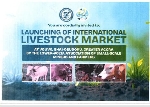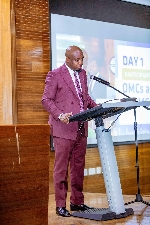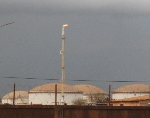Nigerians resist shop closures; say Ghana given them raw deal
 Nigerian and Ghanaian traders have clashed several times over the matter
Nigerian and Ghanaian traders have clashed several times over the matter
Some Nigerian shop owners in Ghana’s national capital have accused the Ghanaian authorities of not treating them fairly as far as the closure of their retail shops on Thursday is concerned.
The Presidential Committee on Retail Trade under the Ministry of Trade and Industry began the shop closure exercise today, 13 August 2020 from the Kwame Nkrumah Circle.
It affects shops owned by foreigners in the retail business.
The Committee’s actions follow notices served ahead of time to these foreigners to that effect.
Also, shops at Opera Square, Zongo Lane, Kantamanto, UTC and Kumasi would be closed to fish out foreigners involved in retail trade in the country without the necessary documents.
One of the affected Nigerians told Class News: “You’ve locked the shops completely for eight months, you opened the shops after eight months and assessed every shop here. You gave each one $1,500 and $2,000 to pay to the Ghana Revenue Authority. They have started making the payments. Some of us have regularised our documents. You’re coming to lock the shops. Where do you expect us to recover the money you asked us to pay?”
“Are Ghanaians being treated this way in Nigeria?” he wondered.
“Millions of Ghanaians are there doing petty business even without passports”, he fumed.
In recent times, there have been several encounters between Ghanaian traders and their foreign counterparts, especially Nigerians, over the involvement of the latter in retail business in Ghanaian markets.
The Ghana Union of Traders Association (GUTA) have frequently confronted the Nigerian trading community in Ghana against retail trading in the Ghanaian markets.
This has led to closure of shops, protests and destruction of property.
The Nigerian trading community has time without number argued that the Economic Community of West African States (ECOWAS) protocols allow free movement of goods and people across West Africa.
However, the ECOWAS protocols give foreigners space to transact business for only 90 days.
Section 28(2) of the Ghana Investment Promotion Centre Act, 865, expressly outlines the conditions under which a person who is not a citizen can engage in trading activities.
It provides that a person who is not a citizen may engage in a trading enterprise if that person invests in the enterprise, not less than US$1 million in cash or goods and services relevant to the investments.
The Act further provides that “trading” includes the purchasing and selling of imported goods and services.
A further condition imposed on foreign enterprises that intend to engage in trading by Section 28(4) is that such an enterprise must employ, at least, 20 skilled Ghanaians.
However, Section 28(5) of the Act stipulates that the minimum foreign capital requirements to invest in Ghana, including for engaging in trading, do not apply to the foreign spouse of a citizen of Ghana to the extent that the foreign spouse is or has been married to a citizen of Ghana for a minimum period of five years continuously or holds an indefinite resident permit prior to registration of an enterprise, amongst others.
Source: Classfmonline.com
Trending Business

Muntaka Entrepreneurship Hub trains over 100 women in Asawase
14:16
Ghana Gold Board rakes in over $10bn ahead of target
09:56
GEXIM faces GHS1.5bn credit exposure as NPLs near 30% — CEO
09:36
Six Degrees delivers immersive experiential production at Kweku Smoke’s revival concert
10:37
GIPC highlights govt’s commitment to retail sector transformation at GUTA conference
03:01
Lower-Volta Small-Scale Miners & Farmers to host international livestock market
00:43
International livestock market launched in Volivo to boost trade and create 500 jobs
17:09
NPA CEO says $200m needed to fully revamp TOR and expand capacity
12:35
TOR resumes crude oil refining after years of inactivity
10:32
Gov't to revive Juapong Textiles through PPP-Ablakwa reveals
10:12




